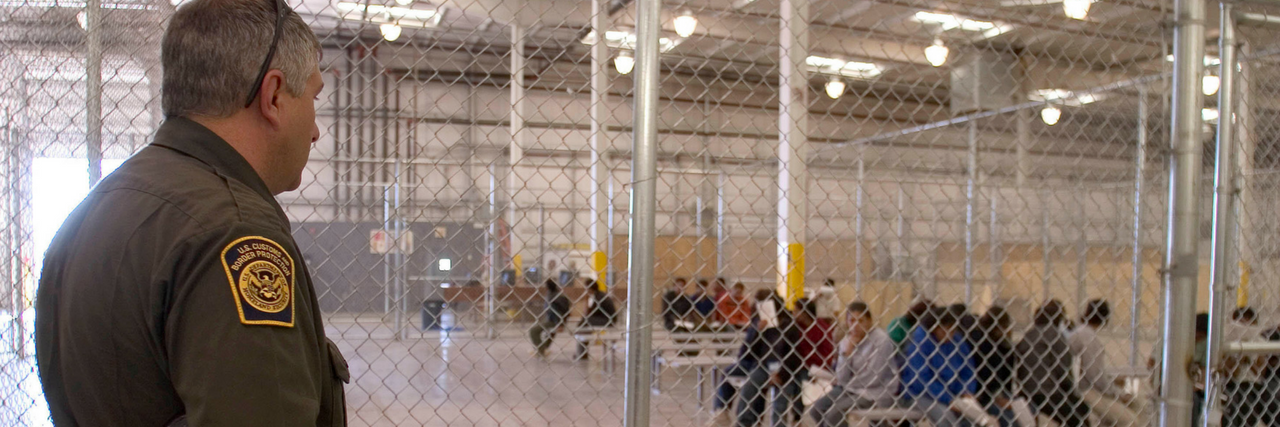Children With Disabilities Are Being Separated From Their Families at the Border
Update: On Wednesday, President Trump signed an executive order to end the separation of immigrant families. The executive order, however, does not address the thousands of children already separated or how they will be reunited with their families.
Many families seeking asylum at the southern border are being separated, including families with children with disabilities. Some of these families are crossing the border illegally while others are using points of entry. No matter where they are crossing, parents and guardians are being detained and their children sent to other detention centers to wait for placement in foster care facilities or with relatives living in the U.S.
While children cannot be held in these detention centers for more than 72 hours under the law, many are staying past that. A 10-year-old girl with Down syndrome and her twin brother were separated from their mother after crossing the border on June 3.
According to U.S. Customs and Border Protection, the mother entered the country illegally with her five children. Three of the children are U.S. citizens and were released to an aunt. The mother admitted to entering the country illegally and is being held as a witness to a smuggling crime. She is not being prosecuted. The twins, who are not U.S. citizens, are sitting in a Texas shelter, even though their father, a legal U.S. resident, lives just 60 miles away. Mexican officials are urging the U.S, government to reunite the children with their father, whom U.S. authorities say they are still evaluating.
Under President Trump’s “zero tolerance” policy, anyone who crosses the border illegally is charged with a federal misdemeanor. Because children cannot go to jail, parents are separated from their children, who are then sent to detention centers, relatives or foster care. Previously, those with children who entered the country illegally were held in family detention centers until their court date and were rarely criminally prosecuted. Today, parents are being separated from their children even when following the law, as is the case for those seeking asylum.
A grandmother seeking asylum with her autistic grandson was separated from him at the Santa Teresa Port of Entry in New Mexico. That was 10 months ago, according to the Texas Tribune.
Maria Vandelice de Bastos traveled to the U.S. with her grandson, who also has epilepsy, after off-duty cops in Brazil threatened her. Vandelice de Bastos’ attorney, Eduardo Beckett, told the Tribune she exposed horrible conditions at her grandson’s school, and the principal’s brother was a cop.
Vandelice de Bastos used to have a visa but was deported after she admitted to working under the table as a babysitter. Those deported from the U.S. are prohibited from re-entering the country for five years. Vandelice de Bastos waited almost 10 before seeking asylum.
“She never lied, she always told the truth and she never tried to sneak into the country,” Beckett told the Tribune.
When Vandelice de Bastos arrived at the point of entry, she passed what is known as a “credible fear” interview. According to the American Immigration Council, refugees who pass this interview have a higher likelihood of gaining asylum.
Despite passing the interview, she was still separated from her grandson, who is now under the care of a state-run facility in Connecticut and requires round-the-clock care. According to the Tribune, the Department of Children and Families in Connecticut is pushing for the release of Vandelice de Bastos. The department said Vandelice de Bastos’ grandson is “having a lot of difficulties in his new environment,” and would benefit from having his grandmother around.
Other agencies aware of the situation have reiterated this as well, including the Heartland Alliance in Chicago, which is funded by the federal Office of Refugee Resettlement. The Heartland Alliance helped place her grandson in the Connecticut facility.
Vandelice de Bastos has cared for her grandson since his parents abandoned him, years ago. His mother legally resides in the U.S. while Vandelice de Bastos stays in a detention center in El Paso, Texas. Asylum seekers can live in the U.S. while awaiting the approval of their application, but some stay detained for the duration of the process.
Many organizations have condemned the Trump’s administration zero tolerance policy, including the American Civil Liberties Union and the Autistic Self Advocacy Network (ASAN).
“This policy is not mandated by law, but is a deliberate act of cruelty the administration has chosen to inflict on some of our most vulnerable,” ASAN’s statement reads. “The devastating consequences of this policy are felt disproportionately by children with disabilities, and it is likely that their rights under the ADA and Rehabilitation Act are being wholly disregarded.”
The American Psychological Association (APA) has also called for an end to the zero tolerance policy.
“Based on empirical evidence of the psychological harm that children and parents experience when separated, we implore you to reconsider this policy and commit to the more humane practice of housing families together pending immigration proceedings to protect them from further trauma,” the APA said.
Immigrants fleeing their home countries for sanctuary are already under a great deal of stress, and family separation at the border will only increase the trauma, the APA added. The association also cited research that prolonged separation leads to more reported symptoms of anxiety and depression in children as well as other mental illnesses such as post-traumatic stress disorder.
“As psychologists, we have documented multiple harmful effects of parent-child separation on children’s emotional and psychological development and well-being and urge that the current policy of family separation be reversed,” it concluded.

